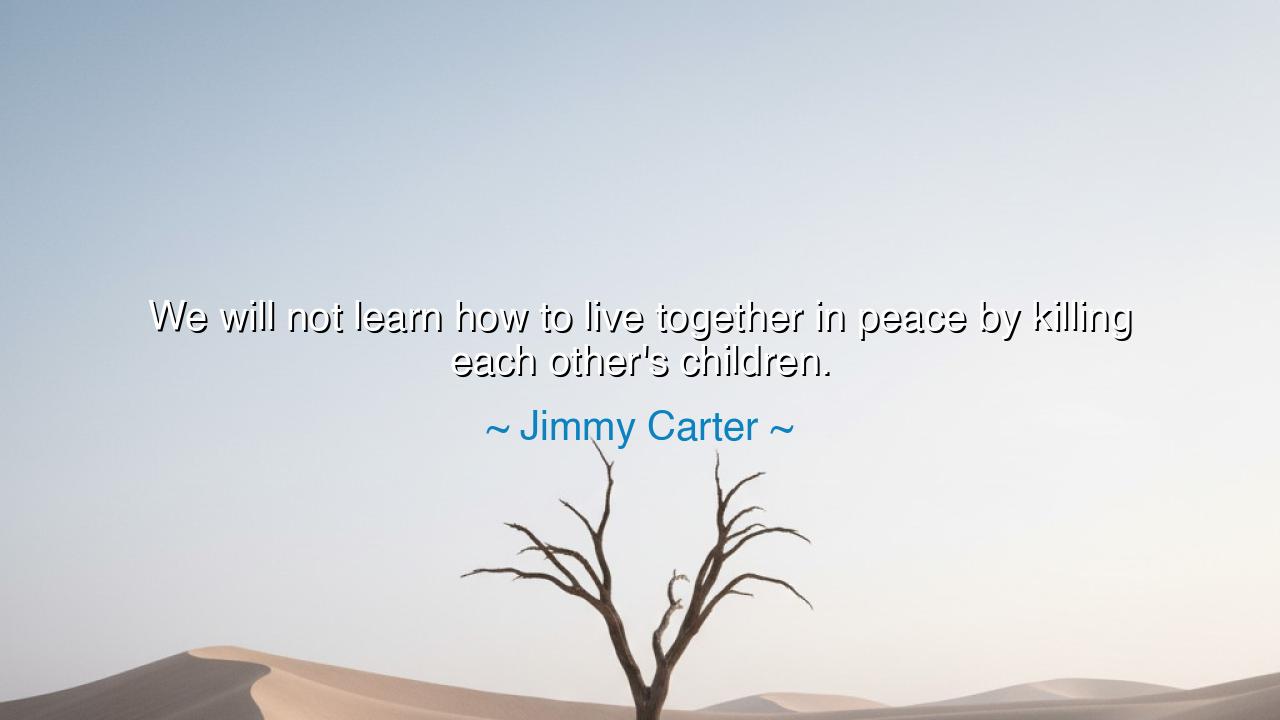
We will not learn how to live together in peace by killing each






"We will not learn how to live together in peace by killing each other’s children." Thus spoke Jimmy Carter, a man of both power and humility, who sought to heal wounds not with swords but with words. In this sentence lies a truth so simple and yet so often ignored: that the future is carried not by the soldiers on the battlefield, but by the children in their cradles. To harm them is to destroy tomorrow with our own hands, and to pretend that from their blood could rise peace is a delusion as ancient as war itself.
The ancients, too, bore witness to this wisdom. Did not the prophet Isaiah declare that swords must be beaten into plowshares, that nations must learn war no more? For every sword lifted against the innocent is a betrayal of life itself, a severing of the very roots from which peace might grow. Carter’s words, spoken in the shadow of conflict, echo this eternal teaching: that vengeance and slaughter cannot teach reconciliation, that killing cannot birth harmony.
History offers countless lessons in this truth. Consider the long war in Northern Ireland, where for decades Catholics and Protestants struck against one another, each loss of life breeding only more hatred. It was not until voices rose above the bloodshed—voices that called for dialogue, forgiveness, and the protection of children—that the Good Friday Agreement was signed. And in that agreement lay the recognition of Carter’s wisdom: peace is not learned through killing, but through protecting life, especially the young who must inherit the earth.
Or recall the tragedy of the Second World War, when whole cities—Dresden, Hiroshima, Nagasaki—saw their children perish beneath fire and shadow. The victors declared triumph, but what triumph is it, when the price is the laughter of children silenced forever? And yet, from the ruins arose movements dedicated to never repeating such destruction. The United Nations itself, however flawed, was born of the resolve that humanity must not build a world on the graves of its young. Carter’s words stand in this same lineage of warning and hope.
Children of tomorrow, understand this: every conflict tempts us with the lie that killing will teach the enemy respect. But death breeds only more death, and hatred only more hatred. The cycle is endless unless broken by courage—the courage not to strike back, the courage to protect the vulnerable, the courage to see the child of the enemy as equal in worth to your own. This is the true battlefield of humanity: not in trenches and deserts, but in the heart that chooses mercy over destruction.
Practical wisdom lies within reach. When you face anger, ask yourself: what will my act teach? If it teaches fear, then fear will return to me. If it teaches pain, then pain will revisit me. But if I teach compassion, if I safeguard the innocent, then I plant the seed of peace. In your families, in your communities, resist the instinct of vengeance. Protect the weak, seek reconciliation, and speak against the harm of the innocent wherever you see it. In doing so, you practice Carter’s wisdom in the smallest yet most powerful way.
Thus the lesson is clear: peace is not a prize won by killing, but a harvest grown by mercy. To harm children is to betray our own future, but to protect them is to honor all humanity. Jimmy Carter’s words are both a warning and a command: if we would ever live together in peace, we must first guard the lives of the young, for in their survival lies the only true hope of the world.






AAdministratorAdministrator
Welcome, honored guests. Please leave a comment, we will respond soon